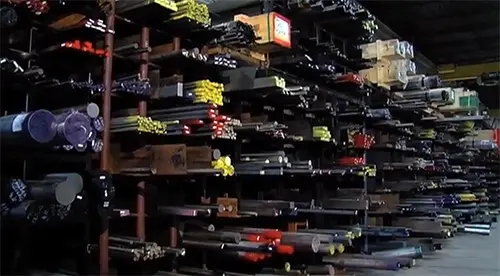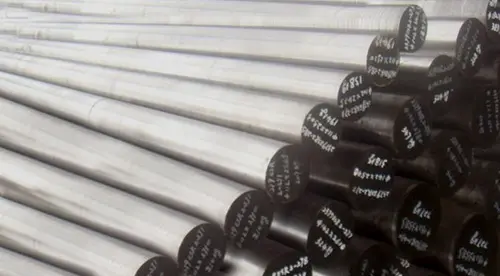
What Is CPM REX M4? often called simply PM M4 steel, is a special-purpose type of high speed steel. It is noted for its wear-resistance characteristics. It has very high carbon and vanadium contents. It is an excellent choice for premium cutting tools such as those used on abrasive alloys, heat-treated materials and castings.
This type of steel provides a distinctive combination of malleable strength, high-impact toughness and extreme wear resistance. The high percentage of vanadium carbides provides the high wear resistance and the fine grain size provides extreme toughness and bending strength.
It is designed to provide an optimum hardening response when treated with vacuum or atmosphere heat methods. Further, this steel performs exceptionally well in cold work tooling applications, outperforming most other high-carbon, high-chromium die steels.
What Are the Benefits of CPM Rex M4 Steel?
The benefits are endless when it comes to utilizing CPM REX M4 steel for your industrial application. These advantages include:
- Lessens weight: In many industries, high-speed steels are routinely used to reinforce areas and provide structure to tools, buildings and machines. CPM M4 steel is solid but is manufactured with less steel than traditional steel alloys. Instead, higher strength steel are used during the manufacturing process. Thus, less metal is used, reducing the overall weight. This type of steel can create strong but light tools and pieces of machinery that can be easily moved or reconfigured.
- Strength: High-speed steel can take on more weight and pressure than traditional steel alloys. CPM M4 can handle increasing bearing loads, making it possible to work with higher compression rates. This type of steel’s strength makes it an excellent option for industries that perform heavy-duty tasks repeatedly.
- Cut costs: Although high-speed steels require a more significant upfront investment than traditional steels, the use of CPM M4 can save money in the long run. When using high-strength steels, less metal is necessary to achieve the desired result. Thus, you can save up to 30% on the metal costs associated with construction and machine production.
- Uniformity: Some steels are not uniform in terms of texture and composition. On the other hand, high-speed steels are created using heat treatments, increasing the steel’s consistency. This standardization increases the steel’s predictability. Material uniformity is an important factor in many automation and manufacturing processes.
- Usability: CPM REX M4 steels are usually manufactured with a high proportion of sulfur. High percentages of sulfur can increase the machinability of the steel without compromising durability.
- Endurance: CPM M4 steels have superior hardness, offering great edge retention properties. Thus, this steel is often used on tools and machines that require a high degree of precision. Further, CPM M4 steel is very resistant to harsh weather and working conditions, making it a good option for industries that operate outdoors.
Common Applications for PM M4 Steel

High-speed steels such as CPM Rex M4 steel can be used in a multitude of applications. Durable steels are routinely used to create industrial tools that need to withstand environmental and working condition stresses.
Tools that feature high-speed steels include drill bits, taps and hammers. Other applications include high-impact construction, aerospace engineering, manufacturing, tooling and automation.
High speed steel offer exceptional hardness and wear resistance, with various grades for toughness or reduced brittleness. Thus, these steels types are commonly used in industrial cutting devices such as milling cutters, saw blades, broaches and more.
Compared to M2 and M3 steel, this alloy handled wear better when working with abrasive materials. These are a few common uses for REX M4:
- Form tool manufacturing
- Punch manufacturing
- Broach inserts
- End mill manufacturing
- Taps
- Header tooling
However, M4 steel should not simply be substituted for other alloys in all cases. The high hardness and high vanadium carbide content make this type of steel very challenging to grind after it has been heat treated. While this may be preferable in some cases, it is not optimal in others. Additionally, its hardness can be a detriment in some applications compared to PM M4, for example.
CPM M4 Steel Composition
The distinctive composition of CPM M4 steel provides a number of benefits including strength, corrosion resistance and durability. Here is an overview of this steel’s composition:
- 1.42% carbon: The carbon improves steel hardness and increases corrosion resistance.
- 4% chromium: Chromium improves steel tensile strength and edge retention.
- 4% vanadium: The vanadium percentage increases wear resistance.
- 5.25% molybdenum: The high percentage of molybdenum in high-speed steels increase strength and machinability.
- .3% manganese: Manganese increases hardness and strength.
- .55% silicon: Silicon is used to improve strength and durability.
- .03% phosphorous: Adding silicon can help increase strength without sacrificing malleability.
- .06 sulfur: As previously mentioned, sulfur can help improve machinability.
- 5.5% tungsten: Tungsten improves the wear and corrosion resistance of the steel.
The density of PM M4 is 0.288 pounds per cubic inch (7972 kilograms per cubic meter). Its specific gravity is 7.97. The annealed hardness of CPM REX M4 steel is BHN 225/255. In this state, its machinability is around 35-40% of 1% carbon steel.
What Are the CPM M4 High Speed Steel Properties?
CPM M4 steels have a wide range of distinct properties that make them an attractive option for a wide variety of applications. CPM REX M4 steel offers the following properties:
- Edge retention
- Wear and corrosion resistance
- Sharpness
- Durability
- Machinability
- Toughness
- Malleability
This is not a comprehensive list of all of the properties offered by CPM M4 steels. Properties can vary based on the unique compassion, manufacturing and heat treatments used on the metal.
CPM REX M4 steel is strong but needs to be correctly maintained to keep it in optimal working condition. You need to sanitize your tools after each use and you may want to have the steels professionally sharpened on an annual basis. It is important to use industrial soap to clean your tools. Additionally, the tools should be thoroughly dried after each washing to prevent rust from forming.
Is CPM M4 Stainless?
Many people assume that CPM M4 is considered stainless steel. However, CPM M4 does not contain a high enough percentage of chromium to be considered stainless. Steels must have a minimum of 12% of chromium to be classified as stainless. CPM M4 is categorized as carbon steel due to its high percentage of carbon.
What Heating Treatments Are Used?
Heat treating is used to change the ways in which metals perform and respond to machining and manufacturing. Heat treatments can be applied to a specific part of the steel to make a material more machinable. Heat treatments can also be applied to the entire material to increase uniformity. Here are the heat treatments commonly used on CPM REX M4 steels:
- Hardening: To harden a high-speed steel, the material is heated to a temperature in which the elements in the steel become solvent. Before hardening treatments, defects in the metal’s crystal lattice structure provide it with its plasticity. Heat treatments address those deficiencies by infusing the metal with a reliable, fine particle solution to strength the metal. The metal must be quenched after it is thoroughly treated to trap the particles in the solution.
- Tempering: Tempering is a heat treatment often used to increase the resilience of the steel. Tempering can also help increase the ductility and hardness of the material, making it easier to machine. CPM M4 steel should be heated to a temperature below the critical point, maintaining hardness while also decreasing brittleness.
- Annealing: Annealing is a technique that heats steel to a specific temperature, holding the material at that temperature for a minimum of one hour to allow the proper transformation to take place. After the material is heated and transformed, it is air-cooled. High-speed steels must always be cooled at a gradual pace to allow the entire annealing process to occur. The annealing method increases the steel’s flexibility and slightly decreases hardness to make it more workable and machinable.
Other heat treatments can be applied to high-speed steels such as CPM M4 to change how it responds to machining. Other techniques that may be used include case hardening, quenching and normalizing.
Thermal Treatments of REX M4
Use a double preheat to reduce distortion and stresses, particularly in large or complex tools. First, heat to 1100°F at a rate of no more than 400°F. Then, heat to between 1450°F and 1550°F. Normal tools can simply be preheated to the second range.
For austenitizing, heat rapidly after preheating. The range for furnace applications is 2200°F to 2250°F. For sale, it is 2175°F to 2225°F.
For pressurized gas quenching, rapidly quench to below 1000°F. For oil, quench to around 900°F (until black) then cool in air to between 125°F and 150°F. For salt, equalized to 1000°F to 1100°F then cool in air to between 125°F and 150°F.
Tempering range is typically between 1000°F and 1100°F. Hold that temperature for two hours than air cool to ambient. Double tempering is required, and a third tempering may be optimal. The third temper should be between 800°F and 1000°F.
Finally, annealing must be performed following hot work and before re-hardening the steel. To do this, heat to 1550°F to 1600°F at a rate of 400°F per hour. Hold that temperature for one hour per inch at 25.4-millimeter thickness. Cool slowly to 1000°F at a rate of 50°F per hour. Finally, let cool to ambient temperature.
Our REX M4 Steel Stock
Griggs Steel has been providing CPM M4 steels to many different industries for more than 60 years. We specialize in supplying commercial clients with materials necessary for tool cutting and forming applications. All of our CPM m4 steel for sale are made of premium materials that can help improve your machines and tools’ performance.
*CPM and Rex M4 are trademarks of Crucible Steel Industries
